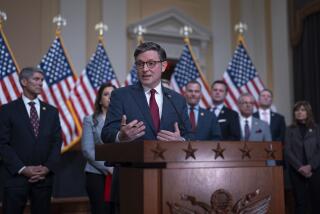The House : 55-M.P.H. Limit
- Share via
The House rejected, 198-218, an amendment allowing states to raise the 55-m.p.h. speed limit on rural interstate highways to 65 m.p.h. The amendment was offered to a transportation bill (HR3129) that was headed for final passage.
Supporter Kenneth J. Gray (D-Ill.) said, “Let us let the states have a little states’ rights here by saying, ‘OK, we think we can go to 65 m.p.h. without doing any harm.’ ”
Opponent Jim Wright (D-Tex.) said, “If we want carnage on the highways, we can do away with this 55 m.p.h. speed limit.”
Members voting yes favored a 65 m.p.h. speed limit on rural interstates.
How They Voted Yea Nay No vote Rep. Anderson (D) x Rep. Dixon (D) x Rep. Dymally (D) x Rep. Fiedler (R) x Rep. Levine (D) x Rep. Lungren (R) x
‘Star Wars’
By a 239-176 vote, the House adopted an amendment cutting fiscal 1987 funding for the proposed “Star Wars” missile defense umbrella from $3.4 billion recommended by the Armed Services Committee to $2.85 billion. The vote occurred as the House neared final passage of the fiscal 1987 defense authorization bill (HR 4428).
President Reagan had requested $5.3 billion for continued development of the Strategic Defense Initiative (SDI), the official name of the proposed shield against incoming missiles. SDI is estimated to cost between $770 billion and $2 trillion if it ever is fully developed.
Amendment supporter Mel Levine (D-Santa Monica) called SDI “an unworkable, undefined, untested Rube Goldberg anti-missile system.”
Opponent Jack Kemp (R-N.Y.) called SDI “the most hopeful, the most positive and progressive means by which we can begin to defend ourselves and our allies against the incredible Soviet offensive capability.”
Members voting yes wanted to trim SDI funding.
How They Voted Yea Nay No vote Rep. Anderson (D) x Rep. Dixon (D) x Rep. Dymally (D) x Rep. Fiedler (R) x Rep. Levine (D) x Rep. Lungren (R) x
Nerve Gas
By a 210-209 vote, the House adopted an amendment to HR 4428 (above) to delay for one year, until October, 1987, the Pentagon’s plan to resume production of nerve gas weaponry. The Senate version of the same defense spending bill provides full funding of the binary nerve gas program, the centerpieces of which are the Bigeye chemical bomb and 155mm artillery shells carrying poison gas, both under development.
Amendment sponsor John Edward Porter (R-Ill.) said that the General Accounting Office judged the Bigeye “the worst (performing) weapons systems the GAO ever evaluated.”
Opponent Ralph Regula (R-Ohio) said, “The delay and equivocation embodied in the Porter amendment sends the wrong signal to the Soviet Union.”
Members voting yes wanted to delay the nerve gas program.
How They Voted Yea Nay No vote Rep. Anderson (D) x Rep. Dixon (D) x Rep. Dymally (D) x Rep. Fiedler (R) x Rep. Levine (D) x Rep. Lungren (R) x
More to Read
Get the L.A. Times Politics newsletter
Deeply reported insights into legislation, politics and policy from Sacramento, Washington and beyond. In your inbox twice per week.
You may occasionally receive promotional content from the Los Angeles Times.










